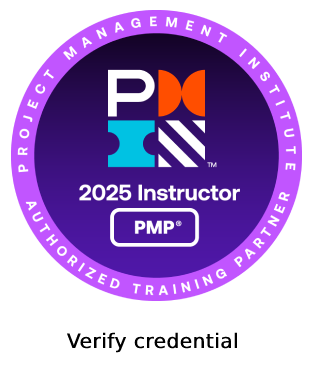Course Description
An ever-increasing number of companies realize that project-based management is an effective – and certainly efficient – way to successfully implement company strategies. Professional project management in turn requires thorough understanding of methods, tools and standards, combined with expertise and experience. This course is aimed at project managers and project team members who have already gained hands-on experience in leading and executing projects. It focuses on developing ‘soft skills’ or those skills that are aimed at improving the individual’s speaking, negotiation, conflict resolution, communication, stress management, and business writing skills.

If you are thinking about PMP certification, I would strongly recommend PMP Exam Prep Bootcamp. All the information and material you need to pass the PMP exam are here.
I passed PMP exam in first attempt. Many thanks to Dr. Petros for your suggestion and (…)
Key Features of Selected Topics in Project Management
Target Audience
- Understand projects and project management disciplines
- Learn the project management processes described in the A Guide to the Project Management Body of Knowledge (PMBOK® Guide),Fifth Edition
- Work out more practice questions to greatly improve their chance of passing the PMP Exam
- Discover tricks and hints on how to answer the exam questions
Target Audience
- Project Managers
- Project Leaders
- Project Team Members
- Managers (Directors, General Managers)
- Project Victor’s Designed Course Material
- Project Victor Course completion certification
- 5-Days at a reputable hotel that includes 2 coffee breaks and International Buffet lunch
- PMI® Contact Hours: Each Contact Hour is 1 PDU (Total of 35 Contact Hours/PDUs for full course)
- Pens, Pencils, Markers, Eraser
- President of PMI Thailand Chapter for 13 years (2011-2023);
- Currently Past President and Chapter Counselor.

- He is a Certified Program Management Professional (PgMP®) (Project Management Institute – www.pmi.org); Certificate # 2079271.
- He is a Certified Project Management Professional (PMP/CAPM®) (Project Management Institute – www.pmi.org); Certificate #1258917
- He is an Agile Certified Practitioner (PMI-ACP®) (Project Management Institute – www.pmi.org); Certificate #2600926
- He is a Certified Scrum Master (CSM®) (Scrum Alliance – www.scrumalliance.org); Certificant ID: 001062861
- He is a SAFe Program Consultant (SPC)® 6.0; Certificate ID: 50804412-3031
- He is a SAFe Agilist® 6.0 (www.scaledagile.com); Certificate ID: 23353981-8934
- He is Certified Risk Management Professional (RMP®) (Project Management Institute – www.pmi.org); Certificate #2033120
- He was Vice President at one of the largest Thai Systems Integrator public company for more than 10 years.
- He has experience managing and leading mega-projects (Information Technology, Airport-related, CCTV-related, Transport-related, and Power Infrastructure) in various industries.
- He is a commercial contract manager, reviewer, and advisor.
- He teaches part-time at King Mongkut University of Technology (Thonburi) – Graduate School of Management and Innovation (Master Degree in Project Management). He is an invited lecturer to Chulalongkorn University.
- He holds a Doctorate degree obtained from Assumption University of Thailand with an international record of publications in refereed journals with a special concentration on business management.
- He has trained more than 5000 program/project managers, project engineers, project coordinators, and project team members since 2010.
- He has helped certify more than 800 Project Management Professionals (PMP/CAPM) in Thailand.
- He is also a highly experienced speaker and trainer who is also passionate about Project Management.
Detailed Course Syllabus
Communications Management Workshop
฿4,000.00
Delivery Method
Instructor led, group-paced, classroom-delivery learning model with structured hands-on activities.
Prerequisites
- No pre-requisites required.
Course Duration
- Five Days (equivalent to 35 Contact Hours or Professional Development Units – PDUs)
Course Outline
Whether it’s in person or via email, with a sponsor or a stakeholder, effective communication serves as the very bedrock of business. It can sway public opinion, give teams a sense of purpose, persuade executives to increase funding-and boost project success rates. A successful project manager MUST be a great communicator! Project Management Communication is a skill that is never perfected, can always be improved and is pivotal in being able to initiate and mobilize a project effectively. This topic highlights the importance of communication skills, presents examples of miscommunication and how they can be prevented, and addresses the removal of barriers that exist at each stage of the communication process.
The complexity of globally dispersed, multi-cultural virtual teams presents a new set of project management challenges. This topic discusses global diversity in relation to project management, communication challenges that project managers face in this highly diverse world, global outsourcing challenges and how to tackle them effectively, and how a project manager can manage virtual teams from diverse backgrounds across varying corporate cultures.
Project Managers are often responsible for many tasks not directly related with their day to day activities. For example, they often join and are asked to present at sales meetings, customer presentations, and at other special occasions. On the other hand, Project Managers often welcome their teams during Project Kick-off meetings, motivate and inspire their team to accomplish project objectives by delivering a motivational speech, and they may also persuade their team or supervisors to take decisions. In many different situations Project Managers engage with team members, customers, supervisors, executives and other influential stakeholders. This topic provides tips and techniques on how Project Managers can better engage with team members and their audience.
- Highlight the importance of good communications on projects.
- Explain the elements of project communications planning, including how to create a communications management plan and perform a stakeholder communications analysis.
- Describe various methods for distributing project information and the advantages and disadvantages of each, discuss the importance of addressing individual communication needs, and calculate the number of communications channels in a project.
Fights, war, battle, screaming matches-conflict is a constant presence in projects. The pressure to deliver unique results within a limited schedule adds more pressure on Project Managers and leaders. The Project Management Book of Knowledge (PMBOK) states: “Managing conflict is one of the biggest challenges a project manager faces.” In any given project, Project Managers might have to use multiple conflict management techniques. This topic discusses different types of conflict, its sources, and presents various resolution techniques.
“Leadership appears to be the art of getting others to want to do something you are convinced should be done.” Project Managers are trained to control three key project constraints including scope, schedule and budget, and to understand the nuances of team dynamics. Project Managers may sometimes even be fanatic about driving productivity and meeting schedule commitments. Other project managers embody all that, but they have something more going for them. They have an uncanny ability to spot red flags, they are zealous communicators, and well respected by peers and business leads. They demonstrate an ability to balance what needs to be done, as driven from the plan, with what should be done to meet the business need, even if it is counter intuitive to the project roadmap. These are the project managers that instill confidence, who are invited to participate in business discussions, and asked to weigh in at the project inception stage. What separates these project managers is that they not only manage, they lead. This topic presents the different qualities and types of a leader and highlights the differences between leaders and managers. Project Managers also learn how to adapt a given leadership style according to a situation they find themselves in.
Negotiation is an invaluable skill for any project manager. Not only do you negotiate agreements with vendors and contractors, but you must effectively negotiate with stakeholders, customers and team members throughout the life of a project. “You don’t get what you deserve, you get what you negotiate” – Chester L. Karrass. Project managers live in a world with limited resources. Whether it is schedule, budget, scope, resources or changes, you have to manage the constraints. To survive, you have to negotiate. For example: There is one key resource that you need for a critical activity on your project. But the functional manager of that resource will not let you use that resource because he or she wants to use that resource on another project. What do you do? You need to find out more about the functional manager’s needs and negotiate to find a win-win solution. Perhaps the key resource can work on similar activities that benefit both projects, thus using his or her time effectively. Developing negotiation skills is not just for expert negotiators who are involved in negotiating major contracts or deals. Project managers can boost their skills by learning and mastering the principles of negotiation. This topic presents negotiation principles for Project Managers, what project managers negotiate, and how to better prepare when confronted with different negotiation scenarios.
Project Management is no doubt one of the most stressful jobs out there as the Project Manager is directly responsible and accountable for the success or failure of a project. Some Project Managers believe they can handle and cope with a high level of stress but there are some who ignore or refuse to recognize they are under stress. The experience of stress is not only impacting the cognitive and behavioral performance but it can also have a negative impact on personal health, well-being, and family life. While Project Managers may not able to change the amount of stress they experience on a daily basis, but they can change how they deal with it. It is important to recognize stress and anxiety before they become more and more difficult to handle and manage. This topic discusses the causes of stress in project management presents stress management techniques for project managers to better handle day-to-day management activities.
An interactive workshop designed to help project managers meet their goals by composing clear and effective notes, memos, letters, and e-mail messages. Participants will use examples of actual work situations to create meaningful and focused messages and responses. At the conclusion of this session, participants will be able to:
- Organize information effectively
- Understand the concepts and principles of readability
- Evaluate and improve their business writing (memo, letter, email) skills
- Match appropriate formats, styles, and media to the goal and the reader
- Gain editorial skills
- Meet business goals and objectives
We’ve Trained Professionals
across Global Companies













































Need more information on Trainings?
We’re a click away
Free Shipping
Free Shipping for orders over £130
Money Guarantee
Within 40 days for an exchange.
Flexible Payment
Pay with Multiple Credit Cards
Online Support
24 hours a day, 7 days a week
Don't compromise on quality!
Subscribe to the newsletter
- TEL : 0980 444 45 456
- MAIL : hello@demo.com
Don't compromise on quality!
- TEL : 0980 444 45 456
- MAIL : hello@demo.com
About Wooma
Help
Categories
Campaigns
Company
Resources
Contact Details
-
200/05, Narathiwat Ratchanakarin Road,
Chongnonsi Yannawa, Bangkok 10120 - info@projectvictor.com
- (66) 92 348 4772
- (66) 02 294 2492
Copyright © 2025. Project Victor Co., Ltd. All Rights Reserved.
- Call us on (66) 92 348 4772
“PMI,” “PMP,” “CAPM,” “PMI-ACP,” “PMBOK,” and the PMI Authorized Training Partner logo are registered marks of the Project Management Institute, Inc.
“ITIL®,” “PRINCE2®,” “MSP®,” and “P3O®” are registered trademarks of AXELOS Limited, used under permission of AXELOS Limited. View Disclaimer





